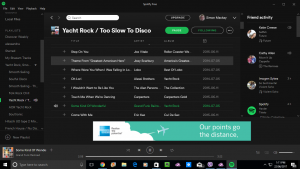Articles

Spotify dabbling in podcasts and strengthening its ties with podcasters is placing it at risk of carrying anti-vaxx and similar disinformation
Nils Lofgren Pulls Music From Spotify – Billboard
My Comments
Spotify has over the last two years jumping on the podcast-hosting wagon even though they were originally providing music on demand.
But just lately they were hosting the podcast output of Joe Rogan who is known for disinformation about COVID vaccines. They even strengthened their business relationship with Joe Rogan using the various content monetisation options they offer and giving it platform-exclusive treatment.
There has been social disdain about Spotify’s business relationship with Joe Rogan due to social responsibility issues relating to disinformation about essential issues such as vaccination. Neil Young and Joni Mitchell had pulled their music from this online music service and an increasing number of their fans are discontinuing business with Spotify. Now Nils Lofgren, the guitarist from the E Street Band associated with Bruce Springsteen is intending to pull music he has “clout” over from Spotify and encourages more musicians to do so.
Tim Burrowes, who founded Mumbrella, even said in his Unmade blog about the possibility of Spotify being subject to what happened with Sky News and Radio 2GB during the Alan Jones days. That was where one or more collective actions took place to drive advertisers to remove their business from these stations. This could be more so where companies have to be aware of brand safety and social responsibility when they advertise their wares.
In some cases, Apple, Google and Amazon could gain traction with their music-on-demand services. But on the other hand, Deezer, Qobuz and Tidal could gain an increased subscriber base especially where there is a desire to focus towards European business or to deal with music-focused media-on-demand services rather than someone who is running video or podcast services in addition.
There are questions about whether a music-streaming service like Spotify should be dabbling in podcasts and spoken-word content. That includes any form of “personalised-radio” services where music, advertising and spoken-word content presented in a manner akin to a local radio station’s output.
Then the other question that will come about is the expectation for online-audio-playback devices like network speakers, hi-fi network streamers and Internet radios. This would extend to other online-media devices like smart TVs or set-top boxes. Here, it is about allowing different audio-streaming services to be associated with these devices and assuring a simplified consistent user experience out of these services for the duration of the device’s lifespan.
That includes operation-by-reference setups like Spotify Connect where you can manage the music from the online music service via your mobile device, regular computer or similar device. But the music plays through your preferred set of speakers or audio device and isn’t interrupted if you make or take a call, receive a message or play games on your mobile device.
What has come about is the content hosted on an online-media platform or the content creators that the platform gives special treatment to may end up affecting that platform’s reputation. This is especially where the content creator is involved in fake news or disinformation.



